New Hair Era | Same Old Racism
When I first cut out my perm in the 1990s I had no reason to believe that I was going to live long enough to see a natural Black hair movement. Nobody, and I mean nobody at my predominantly White Penn State University campus was wearing natural hairstyles then and I remember feeling very alone.
A lot of my friends and advisors would ask me how I planned on keeping my hair “neat”? How could I interview if my hair was not “groomed”? How could I get a job if I couldn’t do basic things like “neatly” hide my kinkiness? I had to remind them — and myself — that:
Natural hair in the workplace is not about “neatness.” Though I’m aware that many who protest against naps moving up the corporate ladder do so out of professed “concerns” for whether or not one’s hair can be simultaneously nappy and “neat.”
When we use the word “neat” in this context – let us recognize what it really means. The word “neat” is about conforming to a standard that says Blackness – whether it is Black hair, skin color, nose/lip/body size is not acceptable “as it is.” This standard says that “Whiteness is the norm” to which “Blackness must adjust.” When Black women are told nappy hair has to be “neat” we know that this is a code word for “straight” or “White.” Straight, blonde, White girl hair is the baseline against which other hair styles are measured – even when respected Black professionals whose hair could never do or be any of those things – are the ones being measured.
But that was then. Over the past few years the natural hair movement has grown from a faint hope to a hopeful possibility and is now full-fledged thing. Now that the start of spring is here (also known as the start of Afro season), my inbox is filling with event notices and invitations to speak at a variety of natural hair expos events and workshops. As in previous years, there are an abundance of workshops on perfecting the twist out, proper hydration techniques, and debates about discrimination among the various hair types.
Unfortunately, what I don’t see a lot of are discussions about some of the more serious issues that are impacting the Black natural hair community. I don’t see a lot of panels or discussions or workshops about protecting the rights of Black women to wear natural hairstyles at work without being fired or disciplined for not straightening their hair. I don’t see programs or workshops that teach us how to protect Black girls and boys from being kicked out of school for daring to wear the hair that grows out of their heads.
I don’t see panels that teach us how to use the law to protect ourselves or instruct us how to file complaints with the Equal Employment Opportunity Commission or other civil rights watch dogs for being wrongfully discriminated against not just for being Black – but for being Black while daring to wear ethnically Black hairstyles. There are plenty of panels about what cultural appropriation looks like (and which non Black celebrity is currently appropriating Black culture), but there’s very little discussion about how we can reclaim and capitalize off of our own cultural elements and icons. I don’t see workshops on how we as Black women who contribute billions of dollars globally to the Black beauty industry can become owners and power players within that industry and transform it to meet our specific cultural needs.
This is highly problematic. And we need to look no further than our own history to see why.
Black Hair History Matters
From the earliest days of Black subjugation and enslavement, the law was used to confine, limit and devalue the beauty of Blackness. The racist framing of which racial groups have the capacity for beauty was one of the most powerful tools of the slave society. This means that access to status, resources and power was typically tied to how closely one could imitate the beauty standards of the slave-owning caste. One’s success largely depended upon how comfortable one could make White people and that comfort was largely based on Black people imitating White beauty standards in order to blend in. For Black women and men today, the relationship between looks, status and opportunity remain intertwined and defined by race. Nowhere do we see this most powerfully than in the realm of Black hair.
During slavery, laws and customs regulated how Black women could wear or adorn their hair. Today, while it is illegal to discriminate against someone’s race per se, there are written and unwritten rules about “grooming” and “dress codes” that serve as back doors to racist discrimination against a beauty standard that centers on Blackness. These rules allow schools, corporations and even the United States military to employ concepts of beauty that are shaped by racist ideology to regulate how Black girls and women can wear their hair to class, work and even on the battlefield. It seems like each week natural hair social media sites are reporting new incidences of Black children being disciplined for wearing their hair in ethnically appropriate hairstyles. As many students prepare to graduate in May, many Black women are also worried about how their hair texture (and skin complexion) may impact their employment options.
These issues are not new and there is much that can be done to address them—when we make the time to do so.
But Where Do We Go From Here?
That’s why I’m so pleased that on Monday, March 28, 2016 at Medgar Evers College, the Center for Law and Social Justice is hosting a full day symposium on the Beauty of Blackness and the Law: Black Hair Edition.
The Center for Law and Social Justice is a racial and social justice institution that was started in the 1980s to address the rampant police brutality and police murders that were happening at that time. In the thirty plus years since the Center first began this work, it has sponsored advocacy projects and litigation in areas as diverse as housing and employment discrimination, police and racial violence, education equity, voting rights, immigration and United States human rights violations. The Center employs a very unique combination of research, public policy advocacy and litigation skills. They operate from a community-based perspective and, most importantly, the mission and vision of CLSJ is to provide quality advocacy, training, and expert services in a personal manner to people of African descent and the disenfranchised.
One of CLSJ’s early projects was to help draft the legislation that authorized the creation of natural hair salons designed to meet the grooming needs of Black women in the state of New York. The Center has represented the legal needs of many within the natural hair community and has been a focal point for community-based advocacy for cultural rights for Black people. So it makes sense that this would be one of the places very concerned about helping the Black natural hair community prepare for the next thirty years of growth.
We know that Black hair and features are some of the arenas where anti-Black sentiment is often on full display and we believe it is imperative that we do our part to protect the cultural rights of Black New Yorkers. So in honor of Women’s History Month, the Center for Law and Social Justice invites you to join us on Monday, March 28, 2016 as we host a full day symposium on the Beauty of Blackness and the Law. Tickets are free and you can register for yours here: http://bit.ly/CLSJBlackWomensHistory.
For media inquiries contact April R. Silver at AKILA WORKSONGS, Inc., via email at pr@akilaworksongs.com or by phone at 718.756.8501. Visit http://bit.ly/CLSJBlackWomensHistory for more information, the detailed workshop schedule and to register.
The Beauty of Blackness and the Law Symposium will feature a full day of panels and workshops in the following segments:
Sankofa (The Past)
9:00 AM – 10:45 AM | The Impact of the Law on Black Hair
How were the law and social norms used historically to restrict the beauty of Blackness?
What new laws were created in order to open the doors for Black women and men to wear ethnically Black hair under culturally appropriate grooming standards?
How did our foremothers lay the ground work for the creation of what we now know as the Natural Hair Community?
Ujima: Is Natural Hair “Professional”? (The Collective)
11:00 AM – 12:30 PM | Black Hair Politics in the Work Place
When it comes to ethnically Black hairstyles, what are our rights in school or the workplace?
How can we protect ourselves from racial discrimination on the job when it comes to Black hairstyles?
Shifts in perception – who gets to define what “professional natural” hair looks like?
Kujichagulia: (The Present)
1:00 PM – 2:30 PM | Black Hair & Beauty in the Era of #BlackLivesMatter
How are laws used to restrict the beauty of Blackness today & how do we defeat them?
What changes are underway that the Black community should take advantage of?
Exploding Natural Black hair & beauty industry
Nia: (Our Purpose)
2:45 PM – 4:00 PM | Creating Our Own Standard of Beauty
How do we create, preserve & promote a Black aesthetic that centers on Black features as a norm?
How do we raise daughters and sons who embraced a normalized appreciation for the beauty of Blackness?
Kuumba: (Creativity)
4:15 PM –5:00PM | Crown Culture Runway Show: Where Trends Meet Tradition
The “Crown Culture” is a Lifestyle Runway Show that depicts the practicality of everyday living and the beauty of a natural lifestyle. Culture is fun and practical as well as entertaining and this culminating event will combine visual and audio elements to captivate audience members with a new vision for the beauty of Blackness. The show will be curated by Creative Director Sakeenah Nzingha Kinard of Nu Ori Productions.
We invite you to join us for this event and look forward to sharing in this special, intimate conversation with the broader community.
*******
Looking for more thoughts from an Afro State of Mind? Check out my book Afro State of Mind: Memories of a Nappy Headed Black Girl now available on Amazon.com in paper back or available here for e-book download! And if you want to stay connected follow me on Twitter, or Instagram “like” Afro State of Mind on Facebook or catch up on my latest Youtube videos!
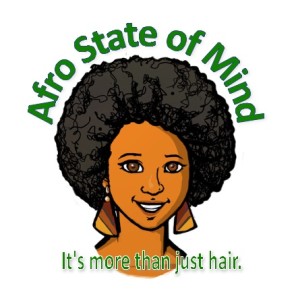
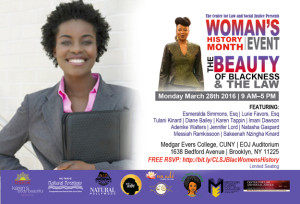

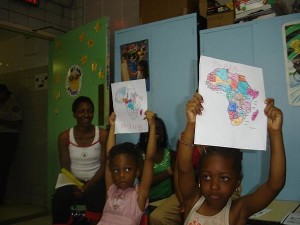
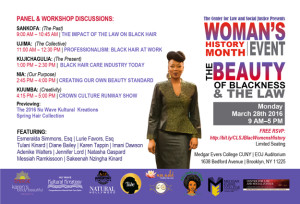

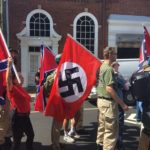
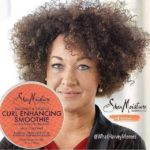
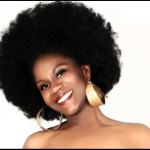
[…] within the black community there’s hair discrimination, as blacks have had to conform to white ideals of beauty to fit in with the larger society for so […]